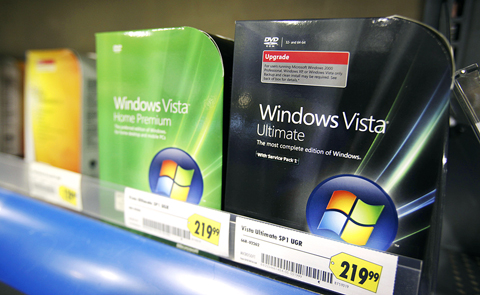Microsoft Corp will offer computer users a choice of rival Web browsers to ward off new EU antitrust fines, EU regulators and Microsoft said on Friday.
Microsoft said its proposal, if accepted by the European Commission, would “fully address” antitrust worries over its browser and “mark a big step forward in addressing a decade of legal issues.”
The EU has charged the company with monopoly abuse for tying the Internet Explorer browser to the Windows operating system installed on most of the world’s desktop computers.

PHOTO: AP
It welcomed Microsoft’s suggestions and said it would evaluate the proposal and seek input from other browser makers and computer companies before making a decision.
If approved, the proposal could be legally binding for five years.
On the browser case, Microsoft is suggesting that users of Windows XP, Vista or its latest release Windows 7 who have Internet Explorer set as the default browser would see a Web page prompting them to pick from five of the most popular browsers in Europe.
Existing Windows users would get the ballot screen from a software update.
Microsoft said the list of browsers would be reviewed twice a year based on usage data for the previous six months.
Microsoft’s browser is the most widely used worldwide, but Mozilla Corp’s Firefox is gaining in popularity.
Mozilla and Google Inc — which recently released the browser Chrome — are supporting the case against Microsoft.
Windows would still include Internet Explorer, but users would be able to disable it. Computer manufacturers would also be able to choose to install other browsers, set them as default and disable Internet Explorer.
The company had said last month that it would remove its browser from Windows entirely to avoid antitrust problems. Instead, it planned to give Internet Explorer away as a download or on a disc.
EU regulators slammed the idea, saying the 5 percent of people who buy Windows off the shelf wouldn’t have a real choice of browsers.
Most people buy the software pre-installed on a computer assembled by manufacturers such as Dell Inc or Hewlett-Packard Co.
Brad Smith, Microsoft’s general counsel, said in a statement that until EU regulators rule on the company’s proposal, it will continue to require PC makers to sell computers with the browserless Windows 7 “E” version in the region. Windows 7 will go on sale on Oct. 22.
The ballot screen that Microsoft is proposing is close to what regulators called for in January when they asked Microsoft to offer several browsers on Windows.
Under that proposal, PC companies would have been responsible for building the browser-choosing technology.
Under Microsoft’s plan, the software maker would handle the technology.
The original ballot-screen proposal was also backed by Norwegian mobile Internet browser maker Opera Software ASA, which triggered the EU antitrust case by complaining that Microsoft was unfairly using its power as the dominant supplier of operating system software to squeeze out rivals.
Opera lawyer Thomas Vinje welcomed Microsoft’s announcement on Friday but said “the devil is in the detail” on how far it would go to calm antitrust fears.
Offering the ballot screen to existing Windows users “will change the world,” Vinje said, because it would encourage developers to make cross-platform software based on Web standards instead of tailoring their work to Microsoft software.
Microsoft has said that it fully complies with existing Internet standards.

Intel Corp chief executive officer Lip-Bu Tan (陳立武) is expected to meet with Taiwanese suppliers next month in conjunction with the opening of the Computex Taipei trade show, supply chain sources said on Monday. The visit, the first for Tan to Taiwan since assuming his new post last month, would be aimed at enhancing Intel’s ties with suppliers in Taiwan as he attempts to help turn around the struggling US chipmaker, the sources said. Tan is to hold a banquet to celebrate Intel’s 40-year presence in Taiwan before Computex opens on May 20 and invite dozens of Taiwanese suppliers to exchange views

Application-specific integrated circuit designer Faraday Technology Corp (智原) yesterday said that although revenue this quarter would decline 30 percent from last quarter, it retained its full-year forecast of revenue growth of 100 percent. The company attributed the quarterly drop to a slowdown in customers’ production of chips using Faraday’s advanced packaging technology. The company is still confident about its revenue growth this year, given its strong “design-win” — or the projects it won to help customers design their chips, Faraday president Steve Wang (王國雍) told an online earnings conference. “The design-win this year is better than we expected. We believe we will win

Chizuko Kimura has become the first female sushi chef in the world to win a Michelin star, fulfilling a promise she made to her dying husband to continue his legacy. The 54-year-old Japanese chef regained the Michelin star her late husband, Shunei Kimura, won three years ago for their Sushi Shunei restaurant in Paris. For Shunei Kimura, the star was a dream come true. However, the joy was short-lived. He died from cancer just three months later in June 2022. He was 65. The following year, the restaurant in the heart of Montmartre lost its star rating. Chizuko Kimura insisted that the new star is still down

While China’s leaders use their economic and political might to fight US President Donald Trump’s trade war “to the end,” its army of social media soldiers are embarking on a more humorous campaign online. Trump’s tariff blitz has seen Washington and Beijing impose eye-watering duties on imports from the other, fanning a standoff between the economic superpowers that has sparked global recession fears and sent markets into a tailspin. Trump says his policy is a response to years of being “ripped off” by other countries and aims to bring manufacturing to the US, forcing companies to employ US workers. However, China’s online warriors